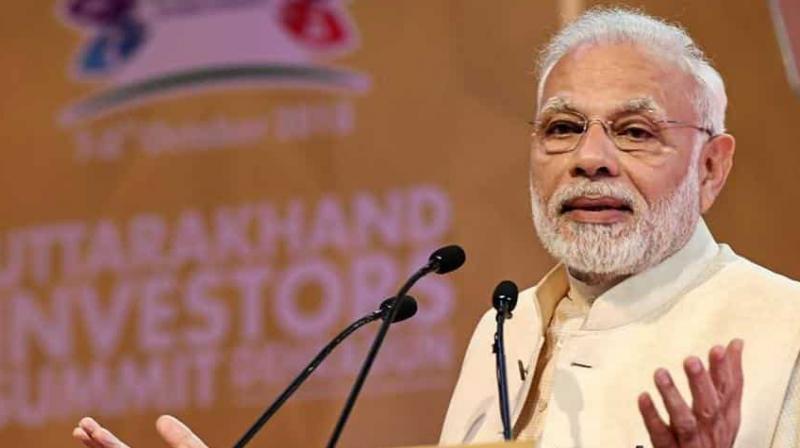Governance key to 2019, don't make it personal'
Indira Gandhi's Emergency was one denial of even the rituals of democracy.

In spite of being hailed by the DMK as the Opposition’s prime ministerial candidate, Rahul Gandhi would be well advised to resist the temptation to see the next Lok Sabha polls as a contest between himself and Narendra Modi. That is exactly what the Bharatiya Janata Party wants. It hopes to distract attention from the party’s manifest failures by projecting a larger-than-life image of the saviour on a white horse. Instead of walking into the trap of what is termed a presidential style election, the Opposition should focus on the BJP’s record in office and on a strict accounting of the extent to which it has lived up to its achche din promise.
The Prime Minister mesmerises village audiences with populist oratory but the recent state Assembly elections exploded the myth of a contrast between the “Naamdaar” (dynast — Mr Gandhi) and “Kaamdaar” (man of action — himself). Anyone with a sense of history knows that far from being irreconcilable, dynasty and democracy merged triumphantly in the 1962 Jaipur Lok Sabha election when Maharani Gayatri Devi claimed the biggest landslide victory — 1,92,909 out of the 2,46,516 votes cast — the world had ever known. Who could have been more dynastic than the daughter of the Maharaja of Cooch Behar, granddaughter of the Gaekwad of Baroda and wife of the Maharaja of Jaipur?
In an equally spectacular triumph that year, Maharani Radharani Mahtab of Burdwan in West Bengal wrested the Assembly seat for the Congress from a legendary former revolutionary, Benoy Krishna Chowdhury, veteran of the undivided Communist Party of India, who had won in 1951 and 1957, defeating on the first occasion no less a personage than Maharani Radharani’s husband, Maharajadhiraja Sir Uday Chand Mahtab Bahadur of Burdwan. But Chowdhury lagged behind the Maharani in 1962 with only 31.07 per cent of the vote against her 67.42 per cent, to be reinstated only when she died a year later. Credited with Operation Barga, which distributed land to more than four million sharecroppers and landless labourers, Chowdhury remarked in 1995 when Jyoti Basu was chief minister and he the second man in West Bengal’s Left Front government: “This is a government of contractors, by contractors and for contractors.”
West Bengal banished the Left Front in 2011, but contractors thrive in every party all over the country. Like businessmen and industrialists, they are the crutches that prop up many democratic politicians who are more monarchical than any blue-blooded royal. Mr Modi is not the first of the species. When the Economist called Indira Gandhi “Empress of India”, it was a comment on her stranglehold on the party and her authoritarian style of ruling. Such distortions of the Westminster system obliged Adlai Stevenson III, the former Illinois senator, to argue at a seminar I once attended in Chicago that India might boast of “representative government” but could not claim to be democratic, as Americans understand democracy.
Mrs Gandhi’s midnight imposition of the Emergency was one denial of even the rituals of democracy, leave alone its substance. The bombshell of partial demonetisation that Mr Modi exploded on November 8, 2016 was another. Reports suggested at the time that even his finance minister may not have been privy to the secret. Nor would any truly democratic government have got rid of two heads of the central bank in an effort to grab its reserves and force it to relax lending curbs on 11 state-run banks in the Reserve Bank of India’s so-called prompt corrective action framework. It can only be assumed the government needs the money to facilitate easy credit in the run-up to next year’s Lok Sabha election.
Mrs Gandhi once set tongues wagging by asking a conference of lawyers in New Delhi to review the Constitution with the possibility of switching over to a presidential system in mind. A variant that was also in the air at the time was some means of directly electing the Prime Minister without reference to any party.
Having captured a record 350 out of 518 seats in 1971, and 351 in 1980, Mrs Gandhi entertained no doubts about her own ability to attract votes. But she feared in those years that reputedly corrupt and negligent Congress politicians were losing all claim to public esteem. However, the “basic structure” of the Constitution doctrine that the Supreme Court propounded in 1973 ruled out any such innovation. Leaders must stand or fall with the party to which they belong.
The BJP cannot escape that axiom. Judging the party by its record, voters in Rajasthan, Madhya Pradesh, Chhattisgarh, Telengana and Mizoram were entitled to ask what happened to the additional jobs they were promised. People may wonder at the national level what happened to the Sabka Sath Sabka Vikas doctrine when a dalit groom in Adityanath’s Uttar Pradesh was dragged off his horse and forced to walk to the wedding site while being pelted with stones.
According to the same saffron-robed chief minister, a police officer’s lynching was only “an accident”. The party says: “The government has only one religion — India first!” Fine. Why then are men — Muslims naturally — lynched on suspicion of the slightest connection with beef? Farmers are on the rampage.
“Swachchh Bharat” has not made India any cleaner. “Make in India” has not boosted domestic manufacture. The Prime Minister’s Office fobbed off a question under the Right to Information Act regarding the promise to deposit '15 lakhs in every citizen’s bank account. The GDP is falling. So is foreign investment.
These are substantive questions affecting fundamentals of governance. The BJP’s eligibility to a second term will depend on satisfactory answers. Voters can’t be fobbed off with heady oratory drenched in vitriol. Personality is no substitute for party or programme.

